
Class 8 Maths Ch 10 Visualising Solid Shapes Ex10.3-NCERT
Ex 10.3 Class 8 Maths Question 1.
Can a polyhedron have for its faces
(i) 3 triangles?
(ii) 4 triangles?
(iii) a square and four triangles?
Solution:
(i) No, because polyhedron must have edges meeting at vertices which are points.
(ii) Yes, because all the edges are meeting at the vertices.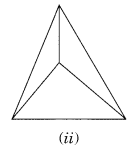
NCERT books
(iii) Yes, because all the eight edges meet at the vertices.
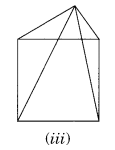
Ex 10.3 Class 8 Maths Question 2.
Is it possible to have a polyhedron with any given number of faces?
(Hint: Think of a pyramid)
Solution: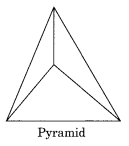
Yes, it is possible if the number of faces is greater than or equal to 4.
Example: Pyramid which has 4 faces.
Ex 10.3 Class 8 Maths Question 3.
Which are prisms among the following?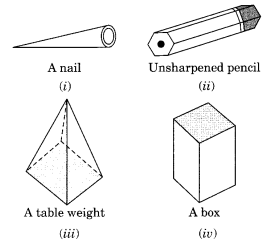
Solution:
Only (ii) unsharpened pencil and (iv) a box are the prism.
Ex 10.3 Class 8 Maths Question 4.
(i) How are prisms and cylinders alike?
(ii) How are pyramids and cones alike?
Solution:
(i) If the number of sides in a prism is increased to certain extent, then the prism will take the shape of cylinder.
(ii) If the number of sides of the pyramid is increased to same extent, then the pyramid becomes a cone.
Ex 10.3 Class 8 Maths Question 5.
Is a square prism same as a cube? Explain.
Solution:
Every square prism cannot be cube. It may be cuboid also.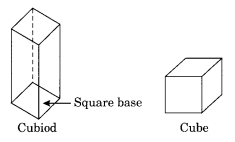
Ex 10.3 Class 8 Maths Question 6.
Verify Euler’s formula for these solids.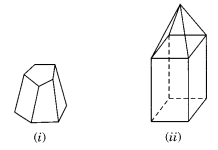
Solution:
(i) Faces = 7
Sides = 15
Vertices = 10
Euler’s formula: F + V – E = 2
⇒ 7 + 10 – 15 = 2
⇒ 2 = 2
Hence, Euler’s formula is verified.
(ii) Faces = 9
Sides = 16
Vertices = 9
Euler’s Formula: F + V – E = 2
⇒ 9 + 9 – 16 = 2
⇒ 2 = 2
Hence, Euler’s formula is verified.
Ex 10.3 Class 8 Maths Question 7.
Using Euler’s formula find the unknown.
| Faces | ? | 5 | 20 |
| Vertices | 6 | ? | 12 |
| Edges | 12 | 9 | ? |
Solution:
| Faces | 8 | 5 | 20 |
| Vertices | 6 | 6 | 12 |
| Edges | 12 | 9 | 30 |
Using Eulers Formula: F + V – E = 2
Ex 10.3 Class 8 Maths Question 8.
Can a polyhedron have 10 faces, 20 edges and 15 vertices?
Solution:
Here faces = 10, Edges = 20, Vertices = 15
According to Euler’s Formula:
F + V – E = 2
⇒ 10 + 15 – 20 = 25 – 20
⇒ 5 ≠ 2
A polyhedron do not have 10 Faces, 20 Edges and 15 Vertices.
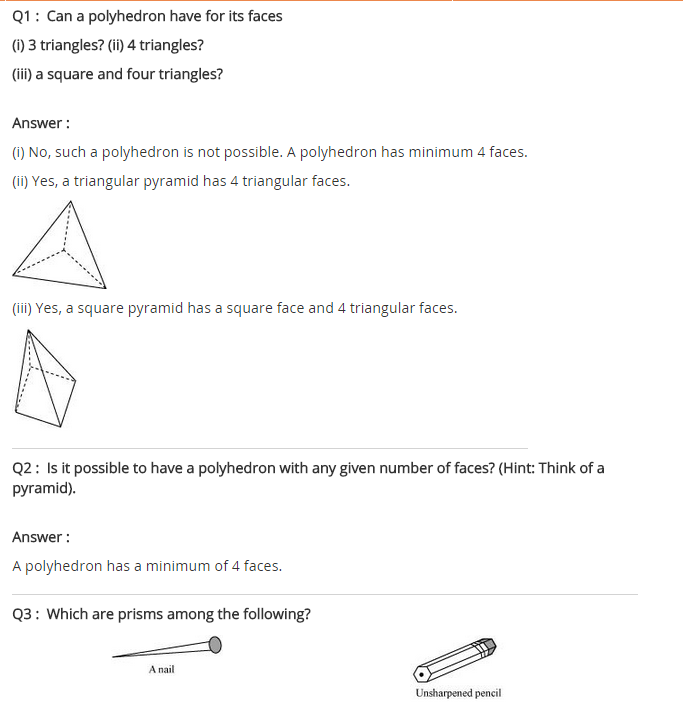
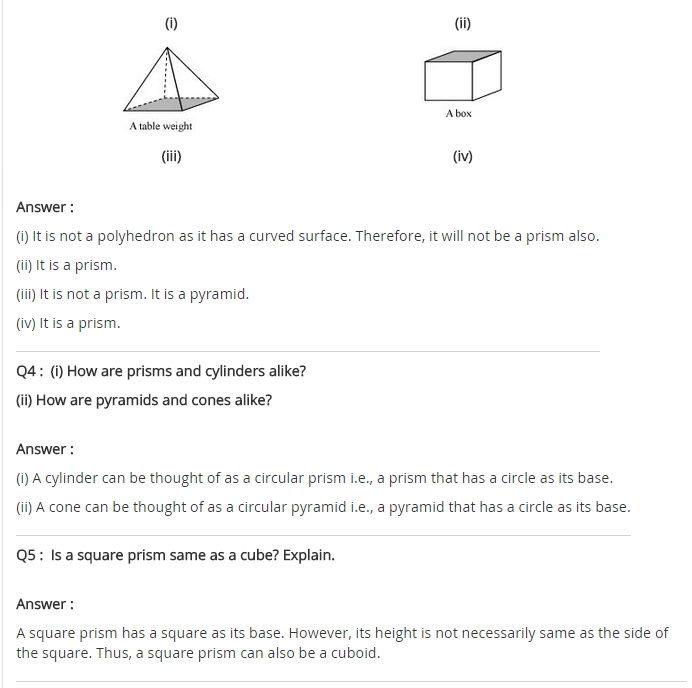
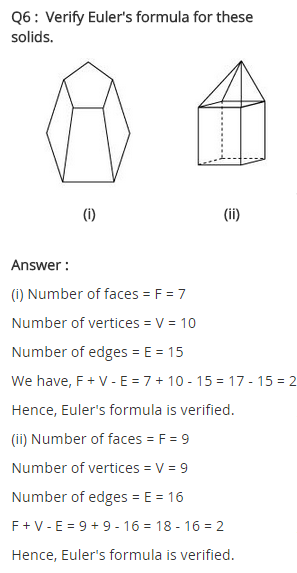
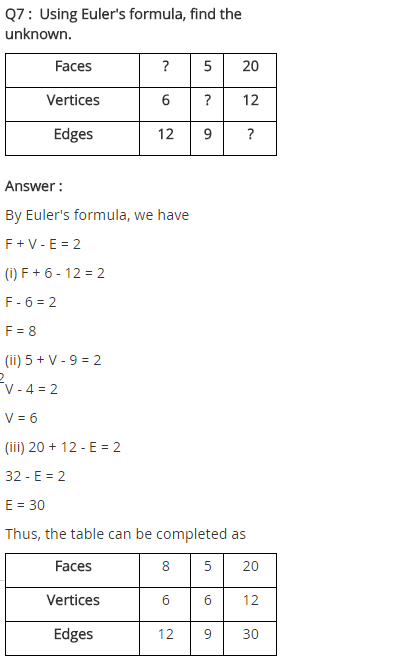
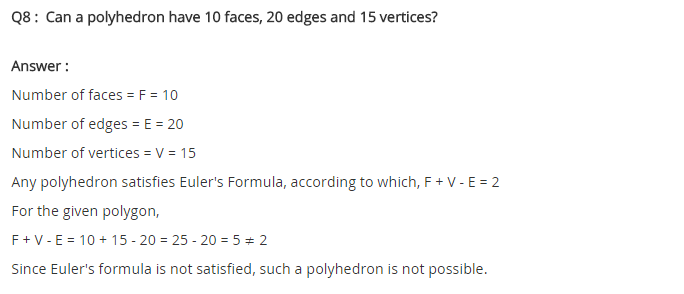
NCERT Solutions for Class 8 Maths Chapter 10 Visualising Solid Shapes Exercise 10.3
Ex 10.3 Class 8 Maths Question 1.
Can a polyhedron have for its faces
(i) 3 triangles?
(ii) 4 triangles?
(iii) a square and four triangles?
Solution:
(i) No, because polyhedron must have edges meeting at vertices which are points.
(ii) Yes, because all the edges are meeting at the vertices.
NCERT books
(iii) Yes, because all the eight edges meet at the vertices.

Ex 10.3 Class 8 Maths Question 2.
Is it possible to have a polyhedron with any given number of faces?
(Hint: Think of a pyramid)
Solution:
Yes, it is possible if the number of faces is greater than or equal to 4.
Example: Pyramid which has 4 faces.
Ex 10.3 Class 8 Maths Question 3.
Which are prisms among the following?
Solution:
Only (ii) unsharpened pencil and (iv) a box are the prism.
Ex 10.3 Class 8 Maths Question 4.
(i) How are prisms and cylinders alike?
(ii) How are pyramids and cones alike?
Solution:
(i) If the number of sides in a prism is increased to certain extent, then the prism will take the shape of cylinder.
(ii) If the number of sides of the pyramid is increased to same extent, then the pyramid becomes a cone.
Ex 10.3 Class 8 Maths Question 5.
Is a square prism same as a cube? Explain.
Solution:
Every square prism cannot be cube. It may be cuboid also.
Ex 10.3 Class 8 Maths Question 6.
Verify Euler’s formula for these solids.
Solution:
(i) Faces = 7
Sides = 15
Vertices = 10
Euler’s formula: F + V – E = 2
⇒ 7 + 10 – 15 = 2
⇒ 2 = 2
Hence, Euler’s formula is verified.
(ii) Faces = 9
Sides = 16
Vertices = 9
Euler’s Formula: F + V – E = 2
⇒ 9 + 9 – 16 = 2
⇒ 2 = 2
Hence, Euler’s formula is verified.
Ex 10.3 Class 8 Maths Question 7.
Using Euler’s formula find the unknown.
| Faces | ? | 5 | 20 |
| Vertices | 6 | ? | 12 |
| Edges | 12 | 9 | ? |
Solution:
| Faces | 8 | 5 | 20 |
| Vertices | 6 | 6 | 12 |
| Edges | 12 | 9 | 30 |
Using Eulers Formula: F + V – E = 2
Ex 10.3 Class 8 Maths Question 8.
Can a polyhedron have 10 faces, 20 edges and 15 vertices?
Solution:
Here faces = 10, Edges = 20, Vertices = 15
According to Euler’s Formula:
📘 Math & Science Solutions by Class
🔹 Class 10
🔹 Class 9
🔹 Class 8
🔹 Class 7
🔹 Class 6
🔹 Class 12
🔹 Class 11
- Class 11 Math Solutions
- Class 11 Physics Solutions
- Class 11 Chemistry Solutions
- Class 11 Biology Solutions
Final Thoughts
Understanding 3D shapes is a vital part of geometry, and Class 8 Maths Ch 10 Visualising Solid Shapes Ex10.3 – NCERT plays a crucial role in building that foundation. This exercise sharpens your spatial reasoning by helping you interpret the front, top, and side views of solid objects—a skill essential not just in academics but also in real-life problem-solving.
By revisiting Class 8 Maths Ch 10 Visualising Solid Shapes Ex10.3 – NCERT, students can improve their ability to visualize and analyze solid structures accurately. Whether preparing for exams or enhancing conceptual clarity, this practice ensures a stronger grasp of geometry fundamentals.
If you’re revising or looking for help with doubts, our detailed solutions for Class 8 Maths Ch 10 Visualising Solid Shapes Ex10.3 – NCERT offer step-by-step guidance with clear diagrams and explanations. These help eliminate confusion and make learning enjoyable.
We recommend reviewing Class 8 Maths Ch 10 Visualising Solid Shapes Ex10.3 – NCERT regularly, especially if you struggle with geometry or spatial orientation questions. Consistent practice with these problems builds accuracy and confidence.
Bookmark this page to keep quick access to Class 8 Maths Ch 10 Visualising Solid Shapes Ex10.3 – NCERT so you can refer to it during homework, revision, or exam prep. Keep practicing and exploring new ways to understand shapes better!
For the official Class 8 Mathematics Solutions, you can visit:
